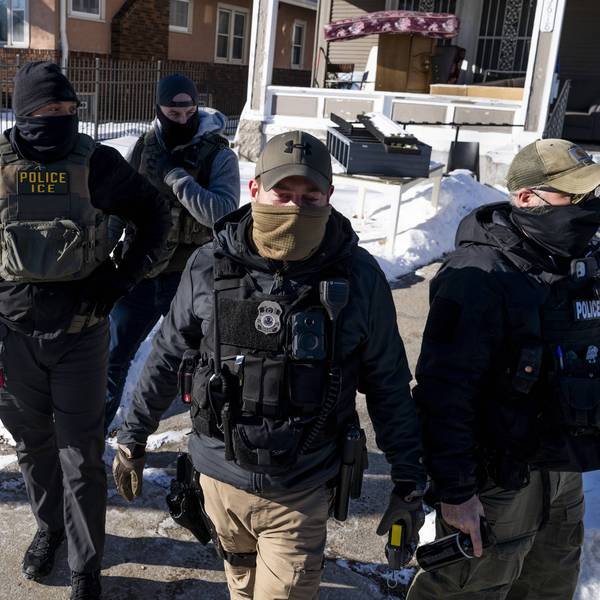Civil rights campaigners on Thursday decried the collapse of bipartisan congressional negotiations on a sweeping police reform bill following last year's murder of George Floyd as "a failure for our democracy," while vowing to continue the fight to hold law enforcement accountable for misconduct.
"The failure of this legislation to move forward is a failure for our democracy."
--Sherrilyn Ifill, NAACP LDF
House lawmakers passed the George Floyd Justice in Policing Act--which, among other reforms, bans police chokeholds and ends so-called qualified immunity for officers--in March by a mostly party-line vote of 220-212.
However, Senate negotiations stalled, most notably over the issue of qualified immunity, which protects state and local officials including police officers from misconduct lawsuits. GOP negotiator Sen. Tim Scott (R-S.C.) called qualified immunity a "poison pill" for members of his party.
Rep. Karen Bass (D-Calif.), who drafted the House version of the bill with Judiciary Committee Chair Jerrold Nadler (D-N.Y.), told reporters Wednesday that "we did the best we could."
When talks shifted to the Senate, Bass and Sen. Cory Booker (D-N.J.) "attempted to engage all parties of goodwill to finally break the logjam there that has stood in the way of historic reform of our nation's police departments," she said in a statement. "We developed proposals that we crafted with law enforcement, proposals crafted with activists--we even made proposals based on executive orders from former presidents."
"We accepted significant compromises, knowing that they would be a tough sell to our community, but still believing that we would be moving the needle forward on this issue," Bass continued. "But every time, more was demanded to the point that there would be no progress made in the bill that we were left discussing."
Booker, who along with then-Sen. Kamala Harris (D-Calif.) drafted the Senate version of the legislation, said in a statement Wednesday that "we made it clear from the beginning of our negotiations that a bill must ensure true accountability, transparency, and the policing standards necessary to bring an end to horrific incidents of violence Americans are routinely seeing--like the murder of George Floyd."
"After months of exhausting every possible pathway to a bipartisan deal, it remains out of reach right now," he added.
In a joint statement, the leaders of seven civil rights groups said that "it is absolutely unacceptable that more than a year after George Floyd was killed and millions took to the streets worldwide to demand an end to police brutality and the systemic criminalization of Black and Brown communities, congressional leaders failed to deliver meaningful legislation that would begin to address this nation's long-standing history of violent, discriminatory policing."
The statement continued:
We will continue to fight and advocate for legislation worthy of George Floyd's name. That must include measures to end qualified immunity; prohibit racial profiling; strengthen the ability of the Department of Justice to bring criminal civil rights actions against officers; create a national registry of police misconduct complaints; end the transfer of military-grade equipment to state and local law enforcement; and restrict funds from law enforcement agencies that do not prohibit the use of chokeholds and other restrictive maneuvers.
"To meet this moment, we demand transformative change that will keep our families and communities safe and end the systemic racism that permeates our criminal legal system," the civil rights leaders added.
Sherrilyn Ifill, president and director-counsel of the NAACP Legal Defense and Education Fund, Inc. (LDF), said in a statement that "the failure of this legislation to move forward is a failure for our democracy."
"The people spoke by the millions, and their demand has not been met," Ifill continued. "At the core of the demand were measures designed to remove barriers to holding law enforcement officers accountable for police brutality. These included addressing qualified immunity,... an amendment to the federal statute that would strengthen the ability of the Department of Justice to bring criminal civil rights actions against officers, and a national database of sustained findings of serious police misconduct and a process for decertifying problem officers."
"We hoped there would be bipartisan agreement on these measures--all of which were part of the bill passed by the House of Representatives last year and again earlier this year," she added. "All of these measures were ultimately rejected in the Senate negotiations. And police violence and discriminatory policing have continued unabated in far too many jurisdictions around the country."
Bass stressed that "our sense of urgency remains, but this issue requires a re-engagement of the legislative process. With our counterparts unwilling to come to a compromise, we have no other option than to explore further avenues to stop police brutality in this country."
"I will not ask our community to wait another 200 days," she vowed, thanking the Biden administration "for supporting our efforts and allowing us room to negotiate while issuing policies like the one last week that impose strict limitations on when federal officers can use chokeholds and 'no-knock warrants.' I now call on President [Joe] Biden and the White House to use the full extent of their constitutionally mandated power to bring about meaningful police reform."
Discussing the Senate bill's failure, Biden said in a statement Wednesday that he would explore "potential further executive actions" to address the issue of police accountability.
"I still hope to sign into law a comprehensive and meaningful police reform bill that honors the name and memory of George Floyd, because we need legislation to ensure lasting and meaningful change," the president said. "But this moment demands action, and we cannot allow those who stand in the way of progress to prevent us from answering the call."




